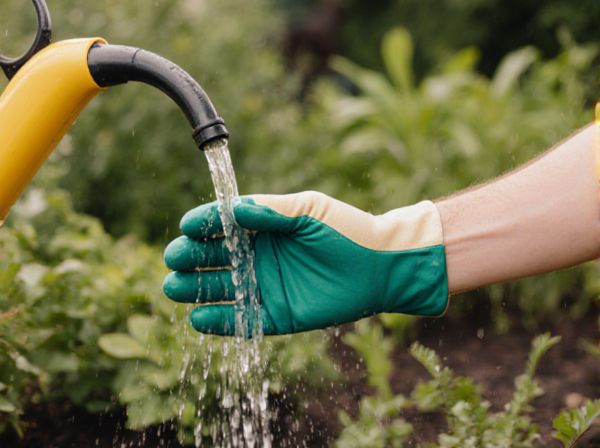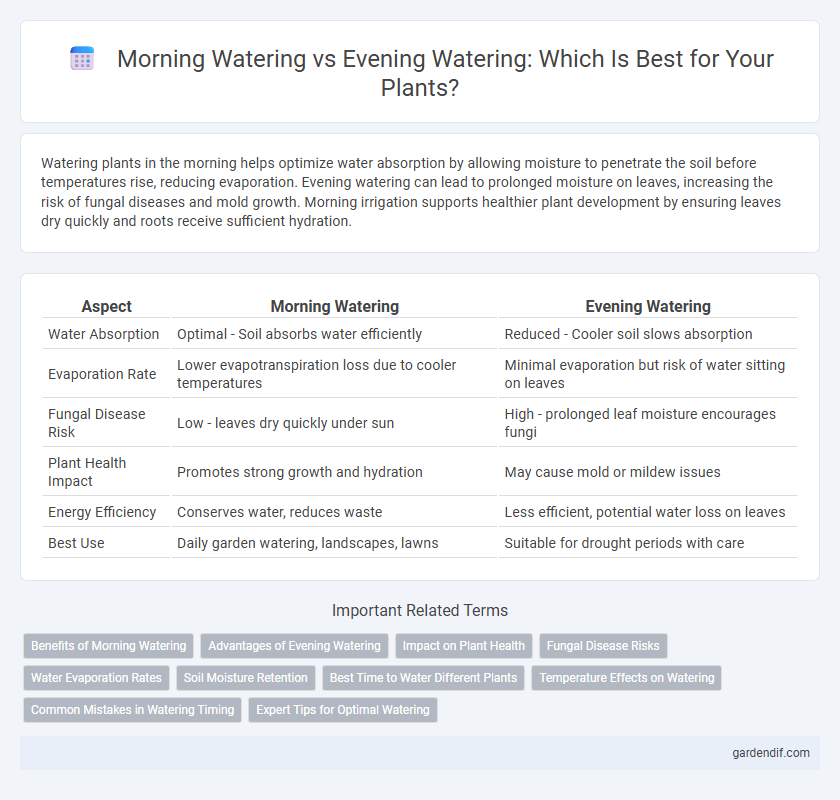
Morning watering vs Evening watering Illustration
Watering plants in the morning helps optimize water absorption by allowing moisture to penetrate the soil before temperatures rise, reducing evaporation. Evening watering can lead to prolonged moisture on leaves, increasing the risk of fungal diseases and mold growth. Morning irrigation supports healthier plant development by ensuring leaves dry quickly and roots receive sufficient hydration.
Table of Comparison
| Aspect | Morning Watering | Evening Watering |
|---|---|---|
| Water Absorption | Optimal - Soil absorbs water efficiently | Reduced - Cooler soil slows absorption |
| Evaporation Rate | Lower evapotranspiration loss due to cooler temperatures | Minimal evaporation but risk of water sitting on leaves |
| Fungal Disease Risk | Low - leaves dry quickly under sun | High - prolonged leaf moisture encourages fungi |
| Plant Health Impact | Promotes strong growth and hydration | May cause mold or mildew issues |
| Energy Efficiency | Conserves water, reduces waste | Less efficient, potential water loss on leaves |
| Best Use | Daily garden watering, landscapes, lawns | Suitable for drought periods with care |
Benefits of Morning Watering
Morning watering enhances plant hydration by reducing evaporation rates due to cooler temperatures and lower wind speeds. It allows sunlight to quickly dry foliage, minimizing the risk of fungal diseases that thrive in damp conditions. Optimizing moisture levels early in the day supports efficient photosynthesis and healthier plant growth.
Advantages of Evening Watering
Evening watering minimizes evaporation by cooler temperatures and reduced sunlight, allowing plants to absorb more moisture efficiently. It also helps reduce water waste and promotes deeper root growth. Furthermore, watering in the evening can prevent heat stress and keep soil temperatures stable overnight.
Impact on Plant Health
Watering plants in the morning allows leaves to dry quickly, reducing the risk of fungal diseases and promoting optimal photosynthesis throughout the day. Evening watering can leave moisture on foliage overnight, creating an environment conducive to mold and mildew growth, which can damage plant health. Consistent morning watering supports stronger root systems and overall plant vitality by aligning with natural plant water uptake cycles.
Fungal Disease Risks
Watering plants in the morning reduces the risk of fungal diseases as leaves dry quickly, minimizing moisture retention that promotes fungal growth. Evening watering increases fungal disease risks since cooler temperatures and darkness prolong leaf wetness, creating an ideal environment for fungi to thrive. Early-day irrigation supports healthier plant conditions and decreases the likelihood of fungal infections.
Water Evaporation Rates
Morning watering is more efficient due to lower temperatures and reduced sunlight, which significantly decrease water evaporation rates compared to evening watering. Evening watering can lead to higher moisture loss from evaporation and increased risk of fungal growth on plants. Optimal water absorption occurs in the cooler morning hours, conserving water and promoting healthier plant roots.
Soil Moisture Retention
Morning watering enhances soil moisture retention by allowing water to penetrate deeply before evaporation increases with daytime heat. Evening watering can leave soil too wet overnight, promoting fungal growth and reducing oxygen availability to roots. Optimal soil moisture retention supports healthy plant growth and minimizes water waste.
Best Time to Water Different Plants
Morning watering is ideal for most plants as it allows leaves to dry quickly, reducing the risk of fungal diseases and promoting efficient water absorption before the heat of the day. Evening watering benefits plants like succulents and cacti by minimizing evaporation and providing moisture overnight, but it can increase disease risk if water sits on foliage too long. For vegetables and leafy greens, watering early morning supports healthy growth, while flowering plants often thrive with consistent morning hydration to optimize nutrient uptake.
Temperature Effects on Watering
Watering plants in the morning optimizes water absorption and minimizes evaporation due to cooler temperatures and increased sunlight, promoting healthier growth. Evening watering exposes plants to higher moisture levels overnight, which can lead to fungal diseases because cooler night temperatures slow evaporation. Temperature plays a crucial role in determining the effectiveness of watering times by influencing water retention and plant hydration efficiency.
Common Mistakes in Watering Timing
Watering plants in the evening often leads to prolonged moisture on leaves, increasing the risk of fungal diseases and root rot, common mistakes that hinder plant health. Morning watering allows excess moisture to evaporate throughout the day, reducing pathogen growth and promoting stronger root development. Avoiding overwatering during cooler, low-light conditions prevents soil saturation and oxygen depletion, crucial for optimal plant hydration and growth.
Expert Tips for Optimal Watering
Morning watering is ideal because it allows plants to absorb moisture before the heat of the day, reducing evaporation and promoting deeper root growth. Evening watering can increase the risk of fungal diseases due to prolonged leaf moisture, especially in humid climates. Experts recommend watering early in the morning, between 5 a.m. and 9 a.m., to maximize hydration efficiency and plant health.
Morning watering vs Evening watering Infographic

 gardendif.com
gardendif.com